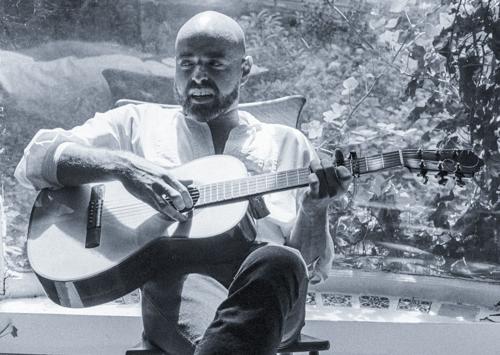Listen to New Voices on Studs Terkel our partnership with 826CHI-here! Read the Story
Showing 1 - 15 of 68 results
-
Win Stracke discusses other musicians he's known
Jun. 22, 1979 Changing up the conversation, Win Stracke talks about artists he's admired like Bill Broonzy and Jim Post. According to Stracke, although Broonzy was a blues musician, he liked humor found in songs. Stracke said he really liked Jim Post, who singled out people who were the best at what they did. As a result, Post asked Stracke to record an album of hymns with him.
-
Win Stracke discusses his career and folk music
Jun. 1, 1962 Songs, music and lyrics are among the topics of Win Stracke's interview. Stracke believed folk songs had a morality all their own. He also explained that songs have a way of recapturing the feeling(s) of an event that the printed work can not convey.
-
Thom Bishop discusses the musical revue "Suburbs of Heaven"
Feb. 7, 1979 Interviewing the cast of the musical revue "Suburbs of Heaven," songwriter Thom Bishop, singers Marty Peifer and Megon McDonough. Songs include "Mr. Arthur's Place," "Why Not Talk to Me?" "The Telephone Song," "Just Because You Didn't See Me," "Suburbs of Heaven," "Times I Tried to Love You," "Amateur Night/New Year's Eve," and "Somebody Feels the Water."
-
Tervalan Porche discusses creole music, language and culture
Dec. 10, 1980 Tervalan Porche discusses creole music, language and culture in which she is an exponent as a singer. The interview starts abruptly which we can deduce that the first part of the introduction was not recorded. This recording has copyrighted material removed.
-
Talking with and presenting a retrospective of the work of folksinger, guitarist, and labor activist Win Stracke
May. 19, 1983 While reminiscing about their 46-year friendship, Studs Terkel presents of retrospective of Win Stracke's work. Stracke said he was surprised that Studs hadn't outgrown their friendship. A few excerpts from past interviews are included in this interview.
-
Sweet Honey In The Rock, an African American female vocal group, discusses their music
Feb. 2, 1978 Sweet Honey In The Rock, an African American female vocal group, discusses their music. They talk to Studs and play folk/blues/traditional music.
-
Studs Terkel reflects on trip to People's Republic of China to describe Inner Mongolian music
Jun. 11, 1981 Studs Terkel travels to a Yurt shepherd's farm commune to hear the old song ballad of a Mongolian hero. It concerns a slave uprising from 200 years ago and shows the unity of the Mongolian people. Terkel compares this music to the Hungarian legacy before moving to the School of Story Telling and School of Music and Story Telling in the capital of Inner Mongolia, Hohhot. We are introduced to the four string hu that played Homeric ballads of drinking songs that could last four days.
-
Studs Terkel in conversation with Buffy Sainte-Marie
Apr. 21, 1972 Studs Terkel interviews Canadian singer-songwriter Buffy Sainte-Marie.
-
Studs Terkel discusses the songs by Steve Goodman and songwriter John Prine
Jul. 29, 1975 Studs Terkel comments on folk music entertainers Stever Goodman and John Prine. He discusses a little about their life and names a variety of their song titles. The musical performances have been erased from this edited version of the recording. Includes an excerpt from a previous interview with John Prine who speaks about his grandfather and a song he wrote about him.
-
Sir Georg Solti talks with Studs Terkel
Feb. 1, 1995 Studs engages the former Chicago Symphony Orchestra conductor, Sir Georg Solti, in a wide-ranging conversation about his life and career. From his early studies in Budapest with Béla Bartók, his string of good-luck opportunities before, during, and after World War II, meeting Toscanini in Lucerne, and starting on top conducting in Frankfurt, London, and finally Chicago. He discusses his many German and European musical influences and contemporaries, and stresses the importance of education, arts funding, and hard work.
-
Singer-songwriters Florence Reece and Pete Seeger discuss writing songs
Mar. 17, 1978 Known for their songs about the working class, both Florence Reece and Pete Seeger talk about how they come about writing the lyrics to songs. Seeger says unbeknownst to them, anyone can write a song. Included within this interview, Seeger plays the banjo and Reece sings a song.
-
Shel Silverstein discusses his books, children's literature, and art; part 2
Nov. 20, 1961 Shel Silverstein discusses his books and children's literature, and art. Shel Silverstein discusses his contemporaries, art, and life experiences.
-
Sam Gary and Josh White discuss folk music and their careers
1960 Interviewing singer, guitarist, and civil rights activist Josh White and blues singer Sam Gary about their blues and folk music.
-
Rosalie Sorrels discusses her career
Sep. 10, 1982 Rosalie Sorrels discusses her career, family, and folk music. Includes Rosalie Sorrels reading her mother's writing. The following songs have been removed due to copyright restrictions: "Traveling Lady", "You Can't Go Home Again", "Her Mantle So Green", "If You Love Me", and "The Long Memory". Cal Hans plays the dobro in the background and makes some comments. Includes performance by pianist Daniel Varsano at the end.



